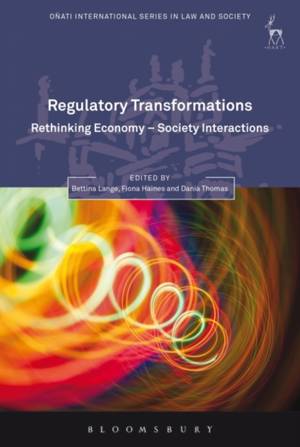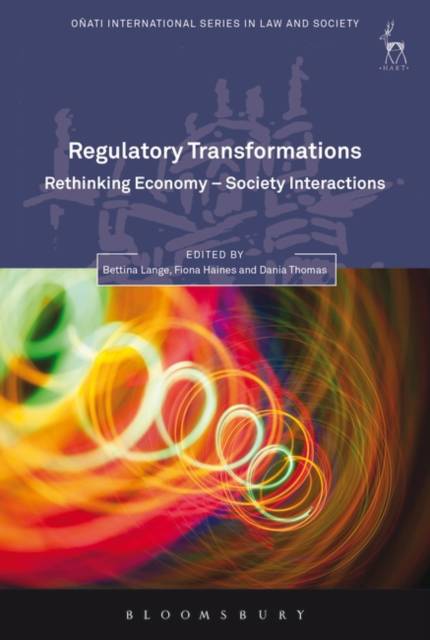
- Retrait gratuit dans votre magasin Club
- 7.000.000 titres dans notre catalogue
- Payer en toute sécurité
- Toujours un magasin près de chez vous
- Retrait gratuit dans votre magasin Club
- 7.000.0000 titres dans notre catalogue
- Payer en toute sécurité
- Toujours un magasin près de chez vous
Regulatory Transformations
Rethinking Economy-Society Interactions
220,45 €
+ 440 points
Description
The issue of whether transnational risk can be regulated through a social sphere goes to the heart of what John Ruggie has described as 'embedded liberalism': how capitalist countries have reconciled markets with the social community that markets require to survive and thrive. This collection, located in the wider debates about global capitalism and its regulation, tackles the challenge of finding a way forward for regulation. It rejects the old divisions of state and market, citizens and consumers, social movements and transnational corporations, as well as 'economic' and 'social' regulation. Instead this rich, multidisciplinary collection engages with a critical theme-the idea of harnessing the regulatory capacity of a social sphere by recognising the embeddedness of economic transactions within a social and political landscape. This collection therefore explores how social norms, practices, actors and institutions frame economic transactions, and thereby regulate risks generated by and for business, state and citizens.
A key strength of this book is its integration of three distinct areas of scholarship: Karl Polanyi's economic sociology, regulation studies and socio-legal studies of transnational hazards. The collection is distinct in that it links the study of specific transnational risk regulatory regimes back to a social-theoretical discussion about economy-society interactions, informed by Polanyi's work. Each of the chapters addresses the way in which economics, as well as economic and social regulation, can never be understood separately from the social, particularly in the transnational context.
Endorsement
'This thought-provoking collection asks the most critical question of our time - how to civilise markets through social accountability and political action. The climate and financial crises we face show how crucial this challenge is. Lange, Haines and Thomas have put together a series of fruitful case studies of the possibilities for embedding economic relationships in social relationships by a series of top-class researchers within their own illuminating and sensitive framing of the issue'.
Professor Christine Parker, Professor of Regulatory Studies at Monash University.
A key strength of this book is its integration of three distinct areas of scholarship: Karl Polanyi's economic sociology, regulation studies and socio-legal studies of transnational hazards. The collection is distinct in that it links the study of specific transnational risk regulatory regimes back to a social-theoretical discussion about economy-society interactions, informed by Polanyi's work. Each of the chapters addresses the way in which economics, as well as economic and social regulation, can never be understood separately from the social, particularly in the transnational context.
Endorsement
'This thought-provoking collection asks the most critical question of our time - how to civilise markets through social accountability and political action. The climate and financial crises we face show how crucial this challenge is. Lange, Haines and Thomas have put together a series of fruitful case studies of the possibilities for embedding economic relationships in social relationships by a series of top-class researchers within their own illuminating and sensitive framing of the issue'.
Professor Christine Parker, Professor of Regulatory Studies at Monash University.
Spécifications
Parties prenantes
- Editeur:
Contenu
- Nombre de pages :
- 272
- Langue:
- Anglais
- Collection :
Caractéristiques
- EAN:
- 9781849463447
- Date de parution :
- 27-08-15
- Format:
- Livre relié
- Format numérique:
- Genaaid
- Dimensions :
- 155 mm x 236 mm
- Poids :
- 566 g

Les avis
Nous publions uniquement les avis qui respectent les conditions requises. Consultez nos conditions pour les avis.





